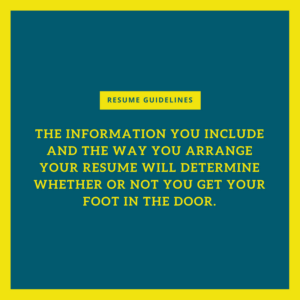
Perhaps one of the most important tools you will use in searching for a job is your resume. The primary purpose of your resume is to interest an employer enough to contact you for an interview. If you are sending out your resume and not getting calls for interviews, the resume is not working. The information you include and the way you arrange it will determine whether or not you get your foot in the door.
An employer typically spends less than 20 seconds reviewing your resume. Therefore, it must be:
❖ Easy to read
❖ Highlight your strengths
❖ Be customized to match the job you want!
WHAT ARE RESUMES FOR?
❖ Job/Internship applications
❖ To accompany a letter of interest to an organization that interests you
❖ Graduate school applications
❖ Career Fairs and job interviews
❖ For persons writing your letter of recommendation
RESUME ASSISTANCE:
Resume and Cover Letter Workshops.
❖ Bellevue College offers a few academic classes focused on resume, interviewing, and job hunting strategies (EXPRL 220, EXPLR 191, EXPRL 192, EXPRL 193, and EXPRL 196).
❖ Workshops offered by the Center for Career Connections are free, non-credit informational sessions (registration is required). Visit the website here.
Mock Interviews
❖ Bellevue College offers mock interviews to provide realistic interview experience and receive feedback without the pressure. You can sign-up for one-hour practice interviews on the Center for Career Connections website.
STEPS TO CREATING A RESUME:
1. Review job/internship announcements. Highlight, circle, underline, start, etc. required and preferred skills and experience. Next create a list of your related qualifications.
2. Gather content information. Decide on the information you want to include on your resume: Education, Relevant Work Experience, Volunteer Work, Awards/Honors, Published Works, Presentations, etc.
3. Decide on a resume format. Chronological or Functional. ***Avoid using resume templates included with word-processing software***. Hiring managers can easily recognize templates and do not regard them as highly as a resume designed from scratch. Also, templates do not allow much control over design and will be more difficult to customize to your own needs. 1
1 Thank you the University of San Francisco Career Services Center for relevant information.
This article is courtesy of Megan Sykes with the Health Sciences, Education, and Wellness Institute @ Bellevue College
PDF: ResumeGuidelines_PDF
Last Updated November 30, 2017